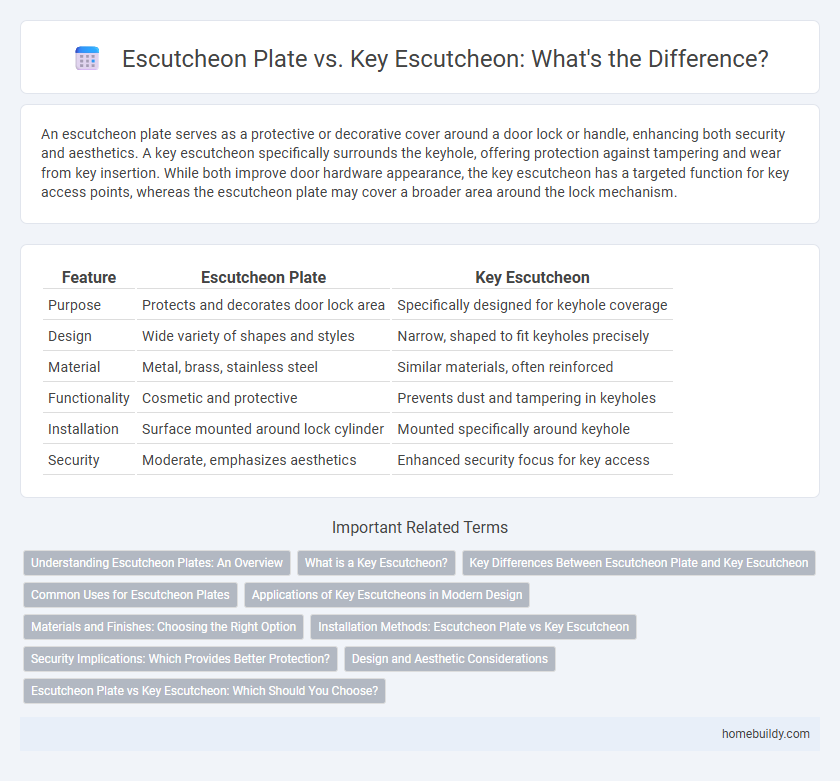An escutcheon plate serves as a protective or decorative cover around a door lock or handle, enhancing both security and aesthetics. A key escutcheon specifically surrounds the keyhole, offering protection against tampering and wear from key insertion. While both improve door hardware appearance, the key escutcheon has a targeted function for key access points, whereas the escutcheon plate may cover a broader area around the lock mechanism.
Table of Comparison
| Feature | Escutcheon Plate | Key Escutcheon |
|---|---|---|
| Purpose | Protects and decorates door lock area | Specifically designed for keyhole coverage |
| Design | Wide variety of shapes and styles | Narrow, shaped to fit keyholes precisely |
| Material | Metal, brass, stainless steel | Similar materials, often reinforced |
| Functionality | Cosmetic and protective | Prevents dust and tampering in keyholes |
| Installation | Surface mounted around lock cylinder | Mounted specifically around keyhole |
| Security | Moderate, emphasizes aesthetics | Enhanced security focus for key access |
Understanding Escutcheon Plates: An Overview
Escutcheon plates serve as protective and decorative covers for keyholes or lock cylinders, enhancing both security and aesthetics on doors. Key escutcheons specifically refer to escutcheon plates designed to surround and protect keyholes, preventing wear and tampering. Understanding the distinction highlights how escutcheon plates function in broader applications, while key escutcheons provide targeted protection and refinement for locking mechanisms.
What is a Key Escutcheon?
A key escutcheon is a small protective plate specifically designed to surround a keyhole, providing both decorative appeal and functional protection against wear and tampering. Unlike a general escutcheon plate that may cover a variety of lock or handle fixtures, the key escutcheon focuses solely on reinforcing and highlighting the keyhole area of doors or cabinets. This specialized plate often features intricate designs and durable materials to enhance security while complementing the overall aesthetic.
Key Differences Between Escutcheon Plate and Key Escutcheon
An escutcheon plate functions primarily as a protective or decorative cover for keyholes on doors or furniture, often providing a larger surface area and more ornate design. A key escutcheon specifically surrounds the keyhole itself, focusing on precise alignment and protection to facilitate key insertion while preventing wear and tampering. Key differences include the escutcheon plate's broader aesthetic and protective role compared to the key escutcheon's specialized focus on keyhole integrity and security.
Common Uses for Escutcheon Plates
Escutcheon plates commonly serve as decorative and protective covers around door keyholes and lock cylinders, preventing wear and enhancing the door's aesthetic appeal. Unlike key escutcheons, which specifically frame the keyhole, escutcheon plates offer broader protection around various types of hardware, including handles and knobs. Their use extends to safeguarding door surfaces from scratches and reducing drafts by sealing gaps around locks.
Applications of Key Escutcheons in Modern Design
Key escutcheons serve as protective and decorative elements for keyholes on doors, enhancing security while contributing to aesthetic appeal in modern interior and exterior design. These components are widely used in residential and commercial properties to safeguard locking mechanisms from wear and tampering. Their versatile materials and finishes allow seamless integration into various architectural styles, from minimalist to classic.
Materials and Finishes: Choosing the Right Option
Escutcheon plates and key escutcheons differ primarily in materials and finishes, with escutcheon plates often crafted from durable metals like brass, stainless steel, or bronze, offering corrosion resistance and aesthetic versatility. Key escutcheons typically feature refined finishes such as polished chrome, satin nickel, or antique brass to complement door hardware and enhance visual appeal. Selecting the right option depends on the specific door style, environmental exposure, and desired durability, ensuring the material and finish align with functional and decorative requirements.
Installation Methods: Escutcheon Plate vs Key Escutcheon
Escutcheon plates typically require surface mounting using screws or adhesive, making installation straightforward and suitable for covering larger areas around door hardware. Key escutcheons often involve recessed installation, fitting flush with the door surface by embedding the plate into a mortised cavity for precise alignment with the keyhole. The choice between surface-mounted escutcheon plates and recessed key escutcheons depends on door type, aesthetic preference, and the need for secure keyhole coverage.
Security Implications: Which Provides Better Protection?
Escutcheon plates and key escutcheons both serve as protective covers for door locks, but key escutcheons typically offer enhanced security by featuring reinforced materials and anti-drill shielding that resist tampering and forced entry. Escutcheon plates primarily provide aesthetic appeal and basic protection from weathering without specialized security features, making them less effective against lock manipulation techniques. For optimal door security, key escutcheons with certified security ratings, such as those meeting BS EN 1906 standards, provide superior defense against lock picking and drilling attacks.
Design and Aesthetic Considerations
Escutcheon plates typically feature a broader design that covers larger areas around door handles or keyholes, providing a refined and decorative boundary that enhances door aesthetics. Key escutcheons are more narrowly focused on framing the keyhole itself, often featuring intricate designs or protective elements tailored to key access points. The choice between an escutcheon plate and a key escutcheon depends on the desired visual impact and functional emphasis, with escutcheon plates offering a more pronounced decorative statement and key escutcheons emphasizing detail and security.
Escutcheon Plate vs Key Escutcheon: Which Should You Choose?
Escutcheon plates provide a decorative and protective cover around door handles or locks, offering a broader surface that enhances door aesthetics and durability. Key escutcheons are specifically designed to protect and reinforce the keyhole area, often featuring a smaller, more focused design that shields against wear and tampering. Choosing between an escutcheon plate and a key escutcheon depends on whether you prioritize overall door appearance and coverage or enhanced keyhole protection and security.
Escutcheon plate vs Key escutcheon Infographic

 homebuildy.com
homebuildy.com